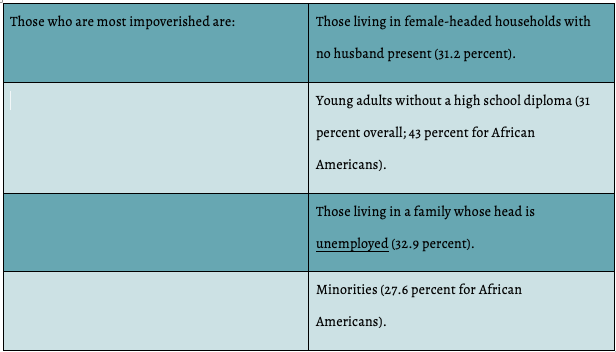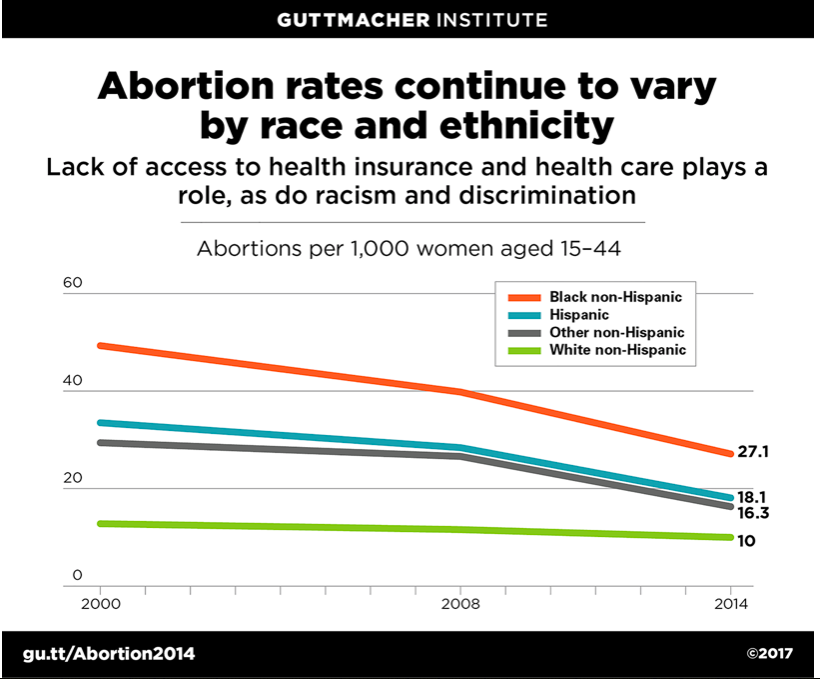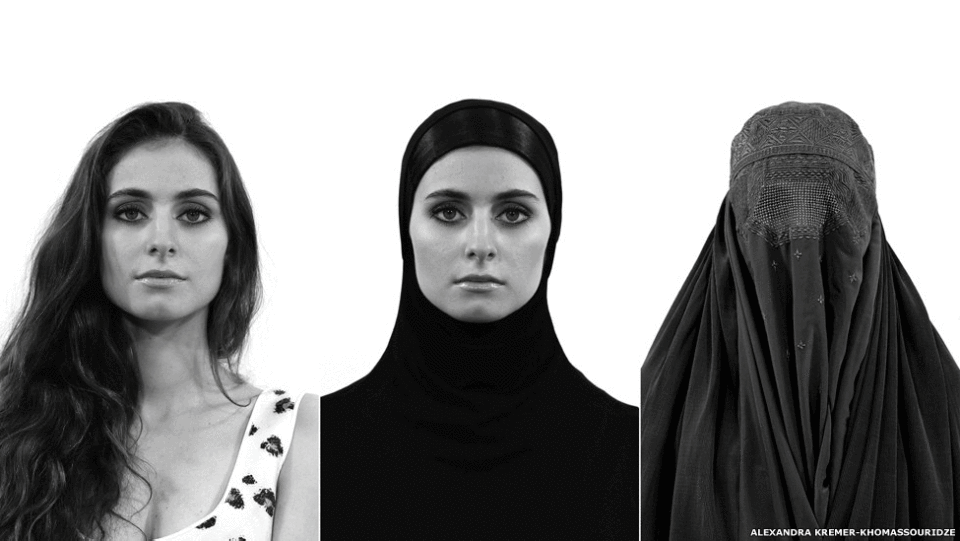The root of the abortion debate is a joke; it is political garbage that masquerades itself as reasonable evidence and invokes a passionate divide on both sides. It does this to perpetuate the issue without ever solving the “need” for abortion. Now, before you continue to read this, know that I am not here to take either of those two sides, they ignore everything that in my opinion could actually point to a solution. The reason why such a complex issue has been simplified is not that either side is right or that there is a cookie cutter solution to this social issue.
In either case, I’m not going to discuss the making of these two very decisively worded labels. Instead, I am going to discuss how mainstream feminists continue to disregard the minorities that they should be fighting to protect.
That’s right, I’m going to talk about those liberal “Nancys” who continue to ignore the role of economic inequality in abortion. It's not always a race issue, but the numbers show intersectionality between income and race is a huge factor when it comes to abortion. There needs to be a push to minimize the abortion stigma to create a learning culture.
Global economic inequality is pro-choosing for you
Let's start by looking at some sources that define poverty since that is what I will be using to make this point.
Based on this, there is an issue with using the federal definition of poverty because it is influenced by the World Bank which considers extreme poverty as, well very extreme… meaning that they take into account only those who have $1.90 or less to spend on a daily basis. It has not adjusted for cost of living increases or how the face of poverty is changing. For this argument, I will only be taking into account the United States because it would be difficult to obtain the numbers on global economic inequality.
What are the numbers of people who are struggling on a daily basis? Well it is difficult to determine, as discussed in The Changing the Face Poverty in America, because there are a few things that need to be taken into account such as wealth distribution, how poverty itself changes over time (mainly as things become more accessible), cost of living relative to income in a specific period, and the way poverty can be discussed in the context of the time. Poverty now looks different than in the 1950s. Here are some examples of what poverty looked like in 2011.
Women are being influenced to choose abortion because of a lack of economic wellness. To quote the Guttmacher Institute:
“…the abortion rate among poor women remains the highest of all groups examined in the study, at 36.6 abortions per 1,000 women of reproductive age. Abortion has become increasingly concentrated among poor women, who accounted for 49% of patients in 2014.”
At a national level, the United States is witnessing extreme poverty being eradicated. Poverty is still there, it is simply changing. As long as this divide in which 31% of female-headed households or that more than 59% are African American, Hispanic or Asian in impoverished conditions, there will be single mothers of color who do end up considering abortion largely because of their economic disadvantage.
Pro-life does not allude to pro-living
When it comes to how income inequality can become a factor in an abortion decision, pro-lifers also aren’t faring that well. Pro-lifers’ choices often get in the way of others’ opportunities to gain economic wellness.
Current voting trends for pro-lifers favor conservatives who include abortion restrictions. These same conservatives, however, also favor economic strategies that perpetuate an income divide. By choosing to lower taxes on the top 1%, conservatives aren’t giving CEOs incentive to hire more or spread their wealth but rather increasing government dependence on middle-class taxation. Not only that but conservative policies also tend to reduce social programs that assist people in poverty.
There is a disconnect between the policies of conservatives and their demands on pregnant women. There ends up being a disregard of how economics can push someone to choose abortion. Those who are choosing to abort because of their personal economic status do it because they cannot guarantee a reasonable lifestyle for another child. I say another child because often they are already mothers choosing to abort. As the chart above highlighted, 55% of those having abortions are already mothers.
Addressing the historical context of abortions
In order for abortion to become less stigmatized and discussed fairly, there needs to be a separation from Margaret Sanger. Sanger has already been given more credit than was due: she founded Planned Parenthood and coined the term “birth control.” She is seen as respectable by “Nancy” liberals because she paved the way for facilities that focused on women's health and placed them in areas where people were not being “served.”
Ever noticed that you will find Planned Parenthood buildings concentrated in, or around areas with communities of color? In fact, a closer look at Margaret Sanger’s life reveals she held white-supremacist, eugenic beliefs that mixed into her life’s work.
After all this time her beliefs still have consequences. Remember those earlier stats? Abortion rates are higher in African American than white communities, even though they are a smaller group.
While Sanger might have had good ideas like highlighting women's health, freeing women from the burden of constant childbirth, educating people about contraceptives, those ideas are continuously overcast by her twisted intent. She was not fond of African American communities and believed their population should be controlled. As such, there is a need to be distant from her when discussing abortion because she was wrong to believe in racist discrimination. Likewise, Sanger’s inclusion makes some pro-lifers feel justified by her track record of enforcing beliefs on others. She doesn’t deserve the glory of a civil rights leader, thinking ahead of her time. She was specifically a product of her time.
During Sanger’s life, there was a social crisis where women were having illegal abortions in unsanitary conditions, dying from them or having seriously damaging consequences. Sanger was equally a product of America's eugenics craze where groups of people who would later have the power to decide who could have children erroneously believed that whites deserved to choose who to sterilize. As a product of her time, she should stay there. If you’re a disheartened mainstream feminist well, let me give you an ignored woman of science that maybe you could look into instead: the mother of the double helix, Rosalind Franklin.
We should take Sanger’s good ideas she had to offer society as a whole as starting points for us to continue the advancement of things like educating on parenthood for all genders; allowing women to have a right to their bodies and be able to use contraceptives at their own discretion, to be informed of them; as well as understanding the economic cost of bringing a child into this modern society.
Addressing both sides
True pro-choicers would not stand for these economic divides; they would rally to mitigate impoverished conditions.
Those who stand for current economic conditions aren’t protecting a woman’s right to choose but rather satisfying themselves with the tools that continue the need for abortions based on poverty or fear of it.
True pro-lifers would not be willing to pass on impoverished lives to newer generations. Instead, they would rally to fight off those conditions which have women consider the idea of an abortion. Pro-lifers who allow intergenerational poverty not only expect people to crawl out of it unscathed but also bear the economic responsibility of more children. They aren’t caring for ‘potential children’ but rather inflicting their belief onto others without any self-restraint or benevolence.
Whether you are a pro-choicer or pro-lifer, you would benefit by rallying together and trying to mitigate poverty to reduce the number of abortions needed because of lower socioeconomic status. Pro-choicers must realize that abortions done as a result of poverty are not done by choice because, I can assure you, nobody would want to choose poverty. Pro-lifers must realize that if they are going to enforce their personal choices on others then they too must make that commitment to quality of life.
Sources:
https://www.debt.org/faqs/americans-in-debt/poverty-united-states/
https://ourworldindata.org/poverty-at-higher-poverty-lines
https://prospect.org/article/changing-face-poverty-america
https://www.guttmacher.org/infographic/2016/us-abortion-patients
https://www.guttmacher.org/report/abortion-worldwide-2017
http://time.com/4081760/margaret-sanger-history-eugenics/
https://www.guttmacher.org/infographic/2017/abortion-rates-income








